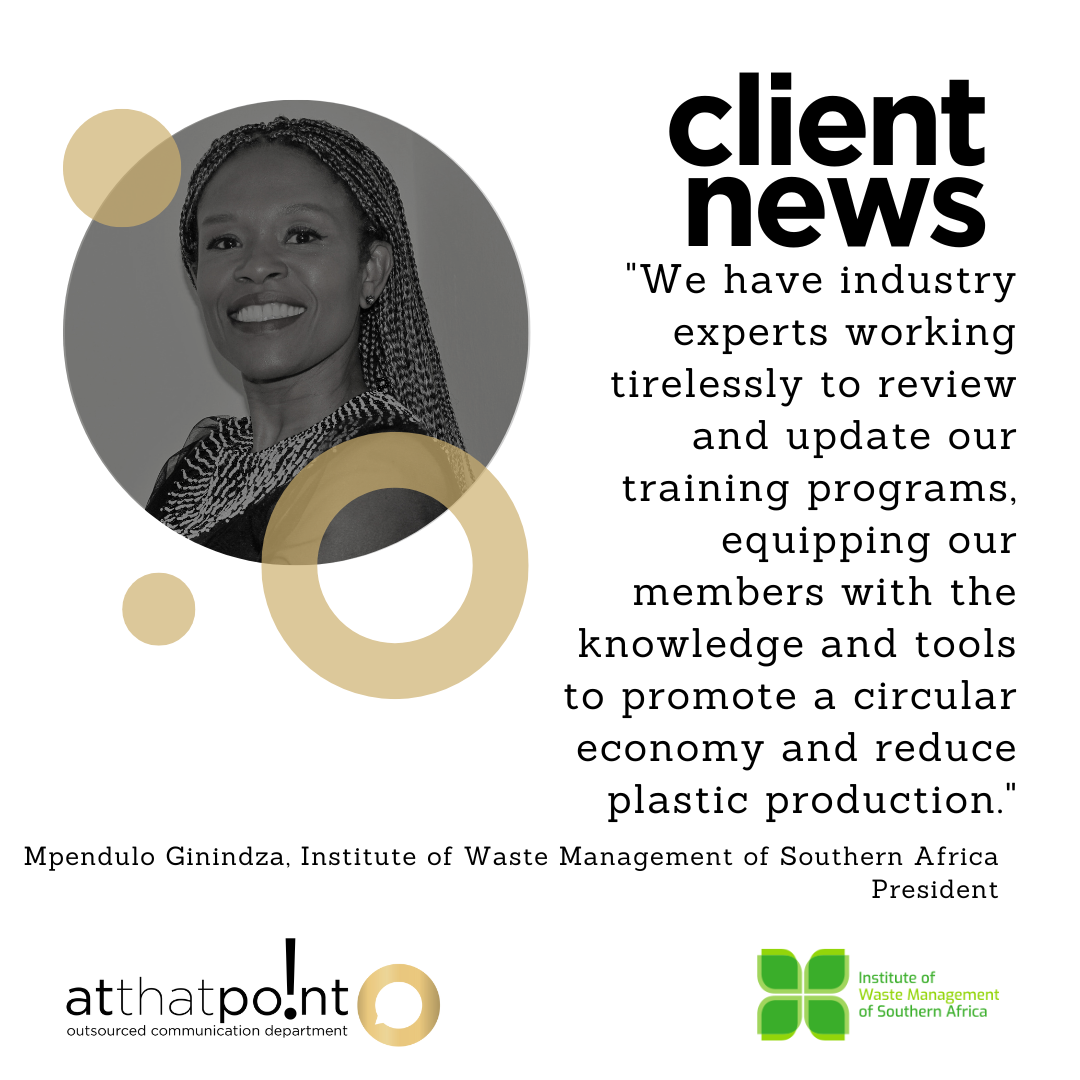 This World Earth Day April 22, 2024, the Institute of Waste Management of Southern Africa (IWMSA) underscores the critical need for concerted efforts to combat plastic pollution, a pressing environmental challenge in South Africa. This year's theme, "Planet vs. Plastics," resonates deeply with the ongoing battle against plastic pollution in our country, emphasising the urgency of transitioning towards sustainable waste management practices and reducing plastic production. According to Mpendulo Ginindza, President of the IWMSA, "The plastic economy in South Africa is based on a linear model of take-make-waste, leading to significant environmental consequences. Improper waste management results in plastic waste infiltrating our rivers, oceans, and communities, posing threats to wildlife and ecosystems.” She says that even seemingly sustainable solutions need to be rethought when it comes to how we handle waste management. According to the Ewastemonitorinfo.org’s new report, The global E-waste Monitor 2024, the green transition and the connecting of off-grid communities will lead to a quadrupling of waste from photovoltaic panels from 0.6 billion kg in 2022 to 2.4 billion kg in 2030. “Small equipment, such as video cameras, toys, microwave ovens and e-cigarettes, also constitutes the largest category of e-waste in terms of mass, accounting for 20 billion kg in 2022, or almost one-third of the world’s total e-waste,” says Ginindza. In alignment with World Earth Day's "Planet vs. Plastics" theme, the IWMSA is devoted to raising awareness about the detrimental impacts of plastic pollution and promoting sustainable solutions to address this pressing issue. Through initiatives such as community clean-ups and educational campaigns, the IWMSA aims to empower individuals, businesses, and government agencies to take proactive steps towards reducing plastic consumption and promoting a circular economy. "We have industry experts working tirelessly to review and update our training programs, equipping our members with the knowledge and tools to promote a circular economy and reduce plastic production," says Ginindza. Collaboration Among Government Agencies, Businesses, and Individuals is needed The IWMSA acknowledges the importance of collaboration among government agencies, businesses, and individuals in tackling plastic pollution and promoting sustainable waste management practices. Through strategic partnerships and collaborative initiatives, the IWMSA wants to harness collective efforts towards achieving the ambitious goal of reducing plastic production by 60% by 2040. “As a member driven organisation, we require participation of members so that we can effectively engage stakeholders. IWMSA has MOUs with strategic partners, these include the DFFE, various universities and NGOs, and industries that support our vision. If we are to achieve the 2040 targets, we must work together. It requires collaboration and participation,” says Ginindza. Despite facing challenges in achieving this target, including the need for increased member participation and stakeholder engagement, the IWMSA remains steadfast in its commitment to driving progress towards a sustainable future. Success stories, such as the development of professionals through IWMSA programs, underscore the organisation's impact in promoting environmental stewardship and responsible waste management practices. Building on this commitment, the International Solid Waste Association (ISWA), played a key role at the first session of the Intergovernmental Negotiating Committee (INC-1) on Plastic Pollution. The meeting, held in Punta del Este, Uruguay from November 28 to December 2, 2022, focused on addressing the severe issue of plastic pollution as part of a wider environmental crisis. During the session, ISWA engaged with various stakeholders and member states, advocating for the development of an international legally binding agreement to combat plastic pollution effectively. The IWMSA has shared ISWA’s recommendations with the Department of Forestry, Fisheries and the Environment who are the National Focal Point. ISWA’s contribution, crafted with insights from its Science and Technical Committee and finalised by a Task Force coordinating committee, is now available on the United Nations Environment Programme website. Consumer Education and Empowerment Key to Fostering Sustainable Consumption Habits As consumers play a crucial role in addressing the plastic pollution crisis, the IWMSA emphasises the importance of consumer education and empowerment in fostering sustainable consumption habits. By making informed choices and supporting initiatives that promote waste management and recycling, individuals can contribute to the shift towards a circular economy. “Looking ahead, the IWMSA's priorities include advancing its mission of promoting responsible waste management and environmental stewardship in South Africa, with a focus on driving the transition towards a circular economy and creating value from secondary resources to support job creation and economic growth,” concludes Ginindza. ENDS MEDIA CONTACT: Idele Prinsloo, [email protected], 082 573 9219 www.atthatpoint.co.za For more information on IWMSA please visit: Website: Home (iwmsa.co.za) X: @IWMSA LinkedIn: Institute of Waste Management of Southern Africa Facebook: Institute of Waste Management of Southern Africa
0 Comments
Leave a Reply. |
AuthorWrite something about yourself. No need to be fancy, just an overview. Archives
June 2024
Categories
All
|

 RSS Feed
RSS Feed